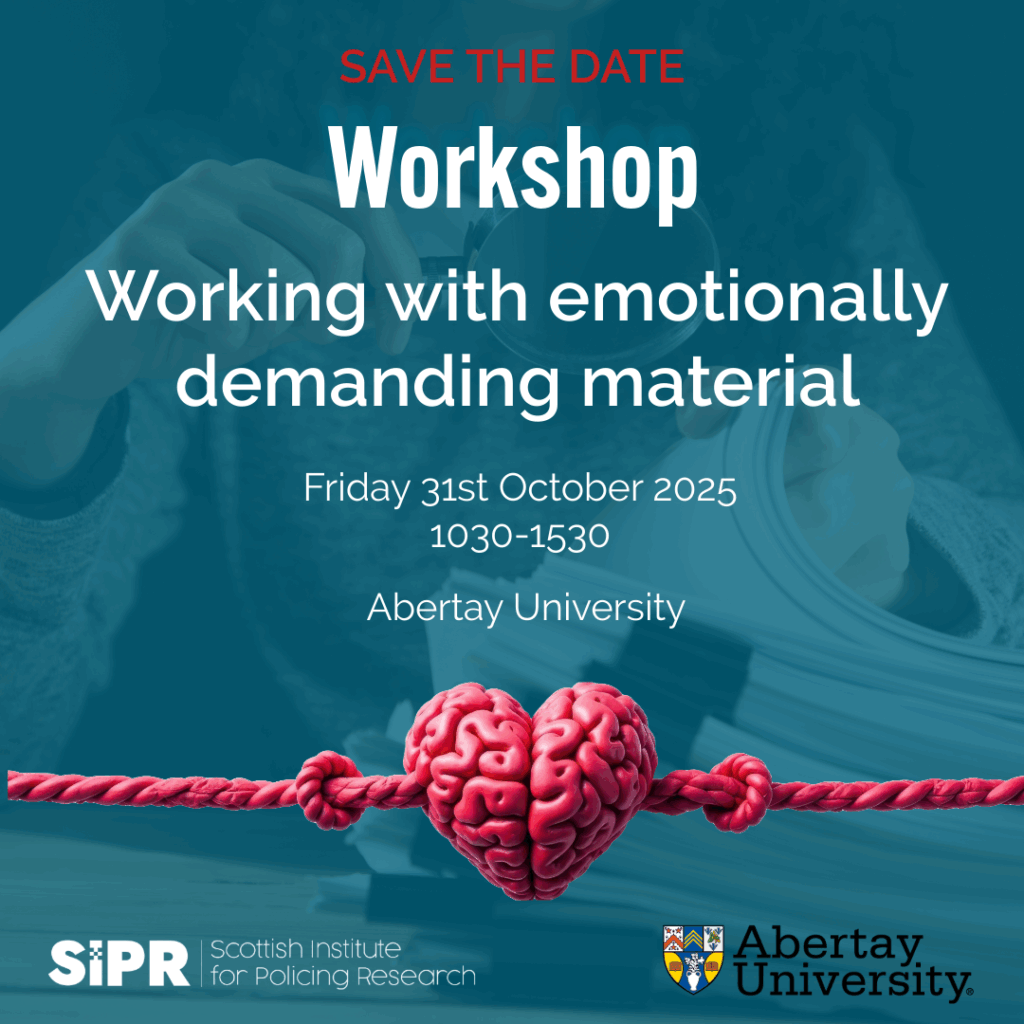

Outline of the day:
10:30 – Registration and coffee
11:00 – Welcome and introductions
11:15 – Presentation on emotionally demanding research and scene setting (45 mins) followed by Q&A (15 mins)
12:15 – Lunch
13:00 – Breakout groups – sharing experiences of working with emotionally demanding research/material or in emotionally demanding spaces and reflections on what works for self-care
14:30 –Coffee break
15:00 – Full group session – Round up of group learning and reflection
15:30 – Workshop close
Post event – Given the scarcity of information on this topic, we plan to write up some of the reflections from the day, in terms of what works and helps, as a SIPR summary to share with a wider audience. The write up will be entirely anonymous, but if any attendees have concerns about this please approach one of the facilitators on the day.
Venue: Events Space, Abertay University, Dundee, https://www.abertay.ac.uk/visit/how-to-find-us/
Workshop organisers/facilitators: The workshop will be led by three academics experienced in conducting emotionally demanding policing research:
• Dr Amy Burrell (University of Birmingham) experienced researcher of sexual violence and behavioural crime linkage.
• Dr Juliane Kloess (University of Edinburgh) experienced researcher of technology-assisted child sexual abuse, including child sexual abuse material.
• Dr Penny Woolnough (SIPR Associate Director; Abertay University) experienced researcher of missing persons, suicide and homicide.
Overview/aims: Emotionally demanding research has been described as “research that demands a tremendous amount of mental, emotional, or physical energy and potentially affects or depletes the researcher’s health or well-being”(1). While this may be directly because of the topic/material being researched (e.g., violence, abuse, mental health, sudden death), it can also be emotionally demanding when it concerns topics similar to the personal/traumatic experiences of the researcher and when unexpected events arise during the research that were not previously identified as a sensitive issue (2). It is essential for researchers and managers to recognise the emotional demands of policing research and to put measures in place to support researchers before and during working on projects which may be emotionally demanding.
In this workshop we aim to:
• Explore what is meant by emotionally demanding research
• Discuss challenges experienced by researchers doing emotionally demanding research
• Identify potential ways in which these challenges can be approached/managed to maximise researcher well-being
• Recognise individual differences in experiences and approaches to doing emotionally demanding research
• Encourage an open dialogue about challenges and experiences of doing emotionally demanding research
• Facilitate networking and the building of longer-term connections for researchers in this domain
The workshop will involve contextual scene setting/presentation(s) by the organisers followed by interactive smaller group/full group sessions. There will also be opportunity for unstructured/informal networking over lunch and coffee.
Some of the topics which the workshop will cover are:
• Dealing with sensitive topics
• Mental health and well-being
• Ethical challenges
• How to work flexibly/responsively when working to deadlines
• Managing physical working spaces and practices
• Understanding and valuing individual differences
The Event Space Room 1502, Level 1 Kydd Building, Abertay University, Dundee, DD1 1HG

Experienced in researching sexual violence, behavioural crime linkage, and offender decision-making, Amy brings a wealth of insight on managing difficult material in forensic and applied settings.

An expert in technology-assisted child sexual abuse, including online offending and child sexual abuse material. Juliane brings deep experience in navigating highly sensitive and ethically complex research landscapes.

A leading researcher in the areas of missing persons, suicide, and homicide. Penny also brings extensive knowledge of policy impact and the emotional dimensions of applied policing research.